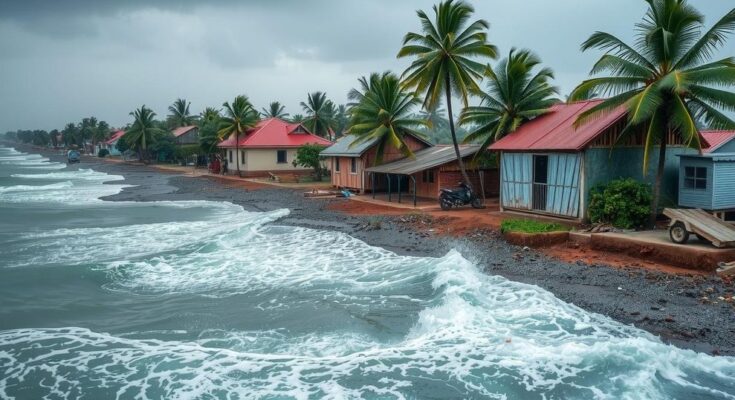Tropical Cyclone Chido has greatly impacted Mozambique, affecting over 453,000 individuals with significant loss of life and property. Critical infrastructure has been destroyed, added to ongoing health crises, including cholera outbreaks, amidst existing conflicts and drought. Urgent humanitarian assistance and resource mobilization are essential to address these multifaceted needs and promote recovery in severely affected areas.
The aftermath of Tropical Cyclone Chido in Mozambique has wrought significant devastation across various communities. The cyclone made landfall on December 15, 2024, delivering over 250 mm of rain within 24 hours and winds reaching up to 120 km/h. By December 24, as reported by the National Institute for Natural Disasters (INGD), more than 453,000 individuals had been impacted, resulting in at least 120 fatalities and 868 injuries, while over 70,000 homes and numerous educational and health facilities suffered severe damage. In Cabo Delgado, where approximately 272,000 people were affected, towns such as Mecufi and Metuge faced near total destruction of housing and infrastructure, compelling residents to seek refuge under precarious conditions.
Moreover, Nampula Province reported additional hardships, with over 175,000 individuals affected and ongoing cholera outbreaks exacerbating public health crises. Damaged infrastructure is impeding both the evacuation of injured individuals and the delivery of essential resources. Authorities, along with local and international humanitarian partners, are vigorously mobilizing efforts to assess needs and provide immediate assistance. Nonetheless, the scale of the disaster has overwhelmed available resources, highlighting the urgent demand for further aid.
In addition to the immediate physical requirements for food, clean water, and shelter, there is an urgent necessity for mental and psychosocial support for the affected populations, many of whom are confronting trauma and loss. Reports indicate rising risks of gender-based violence (GBV), thus necessitating focused preventive measures and responsive actions within the disaster response framework. This multifaceted crisis requires a coordinated and comprehensive approach to ensure the effective distribution of services and support to the impacted communities. The government and humanitarian partners are actively appealing for more support to replenish severely depleted resources, thereby ensuring continued assistance amidst an increasingly alarming humanitarian situation.
As Cyclone Chido strikes at a tumultuous time—on the heels of ongoing drought, conflict, and a cholera outbreak—the immediate humanitarian response must aim to stabilize conditions and prevent further loss of life. The call for resources is paramount, underscoring the critical importance of addressing both immediate and long-term recovery needs in Mozambique.
Tropical Cyclone Chido has had a catastrophic impact on Mozambique, particularly in the northern provinces of Cabo Delgado and Nampula. Its landfall was marked by intense rainfall and wind speeds that caused widespread destruction to infrastructure, housing, and essential services, pushing local populations into dire situations. Furthermore, the cyclone struck amidst already prevailing crises such as widespread conflict displacing individuals, agricultural failures due to drought, and the ongoing cholera epidemic, compounding the severity of humanitarian needs. The confluence of these events has necessitated urgent intervention and assistance to mitigate further adverse effects.
In summary, the devastation wrought by Tropical Cyclone Chido on Mozambique’s communities has highlighted the urgent need for humanitarian assistance and resource mobilization. With significant infrastructure damage, health crises, and increasing risks of violence, a comprehensive emergency response is critical. The ongoing situation demands coordinated efforts from governmental and humanitarian agencies to deliver much-needed aid and support to affected populations. Immediate action is essential to alleviate suffering and facilitate recovery in this already overwhelmed region.
Original Source: reliefweb.int




